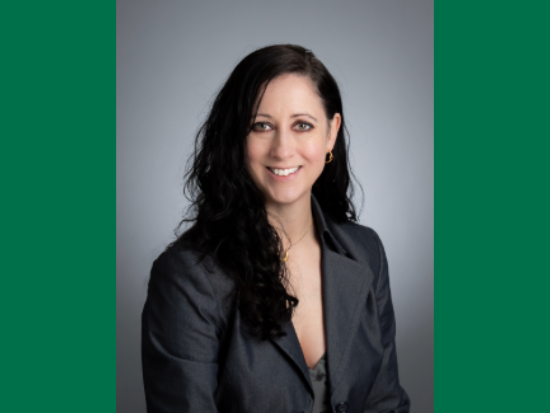 The UAB Department of Neurology welcomed Rebecca Brown, M.D., Ph.D., as an associate professor in November 2024.
The UAB Department of Neurology welcomed Rebecca Brown, M.D., Ph.D., as an associate professor in November 2024.
Brown completed her undergraduate degree at the University of Chicago, earning an A.B. in Biology with concentrations in neuroscience, ecology, and evolution. Brown completed a Ph.D. program at the University of Texas at Austin and continued with a postdoctoral fellowship in human performance under stress, focusing on the effects of sleep deprivation on physical and cognitive performance in soldiers. Brown moved to UT Southwestern Medical Center in Dallas, where she was introduced to neurofibromatosis type 1 (NF1) through laboratory research and shadowing. After completing her neurology residency at the Mount Sinai Hospital System in New York City, Brown completed a neuro-oncology fellowship at Memorial Sloan Kettering Cancer Center.
Brown shares more about her background and her excitement in this new role.
Can you share your professional background and experiences prior to joining our institution?
Brown: During the COVID-19 pandemic, I shifted my research towards clinical trials. At Memorial Sloan Kettering Cancer Center, we did not treat the benign aspects of patients with NF1 and schwannomatosis (SWN), so I accepted a position at Mount Sinai Hospital (MSH) as an Assistant Professor of Neuro-Oncology. At MSH, I established an all-ages NF and SWN Clinic, led the molecular tumor board, instituted a neurology-led procedure clinic for the resection of cutaneous tumors associated with NF1, and opened numerous investigator-initiated and industry-sponsored trials.
What inspired you to pursue a career in this field?
Brown: I have always been a “nerdo-scientist” at heart. The comedian Emo Phillips once famously said, “I used to think that the brain was the most wonderful organ in my body. Then I realized who was telling me this.” I’m still listening. In medical school, I tried to keep an open mind about other specialties, but deep down, I was always drawn to neurology. I love that a neurologist can still practice in the absence of labs or scans (in case of a zombie apocalypse) and that the old masters still have so much to teach us from their centuries-old insights on the neurologic exam. The nervous system is the most complex in the human body, and as neurologists, we will always be challenged.
What is your primary area of expertise, and what sparked your passion for it?
Brown: My interest in NF1 was initially driven by research questions: why do these patients develop benign, self-limiting tumors in one location, such as small nerves of the skin, yet large, potentially malignant tumors in other locations, like the large nerves or plexi, despite both tumors being molecularly identical? Through clinical exposure, I recognized that these patients are remarkably resilient, diverse, and in need of expert care. My interest in NF and SWN led me to pursue a career in neuro-oncology, although my dermatology mentor did try to lure me into dermatology.
What aspects of your new role here are you most excited about?
Brown: I have known about and have been following the excellent research at UAB neuro-oncology and genetics for many years. I am excited to bring my unique background, including relationships with industry sponsors, clinical trial management experience, basic science knowledge, and expertise in neuro-oncology and NF/SWN, to UAB. My goal is to provide more patients with clinical trial options and push the envelope of novel therapies in neuro-oncology. In addition to research expansion, I will be growing the size and capabilities of our NF/SWN clinic and engaging in patient outreach. I also hope to integrate more with the residents and trainees in neurology to demonstrate how exciting our field is and inspire future neuro-oncologists.
What are your goals for making an impact through both your teaching and patient care in this role?
Brown: I want to grow UAB neuro-oncology’s national and international presence and become a destination site for NF/SWN clinical care. It’s important to think big about the future of clinical care and groundbreaking research at UAB neuro-oncology. With UAB’s extensive patient catchment area and extraordinary clinical expertise, we can become a leading name in neuro-oncology nationally and internationally.
Anything else you’d like to add?
Brown: I would love for medical students and residents to rotate with us in neuro-oncology. There are one-on-one teaching opportunities and we can discuss research projects.